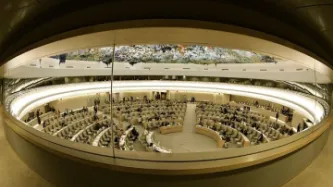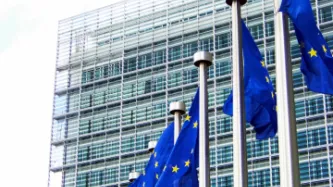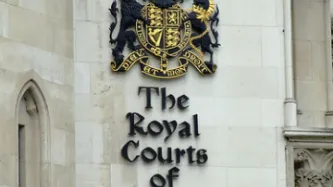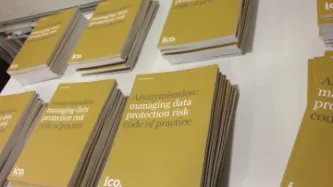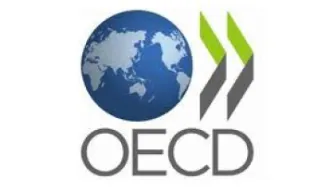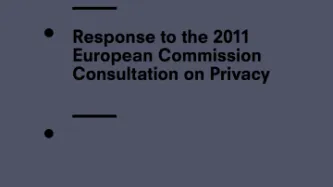Search
Content type: News & Analysis
What do Honduras, Pakistan, and Switzerland have in common? They are all bound to respect and protect the right to privacy under Article 17 of the International Covenant on Civil and Political Rights. And in July 2017, they all also happened to be under the scrutiny of the UN Human Rights Committee, which found the countries’ human rights record wanting in many respects, including the scope of their surveillance legislation.
Intelligence sharing
Reviewing Pakistan, the Committee…
Content type: Advocacy
This week, from 17th-20th October 2016, the Kingdom of Morocco will be hosting the 38th International Conference of Data Protection and Privacy Commissioners (ICDPPC).
And two scenarios could play out…
Scenario one — like many other occasions, this will be used as wonderfully strategic PR stunt, whereby participants will be whisked directly from the airport to their hotel to the conference venue, and will be enchanted by the genuinely warm Moroccan hospitality. But they will leave…
Content type: Advocacy
This stakeholder report is a submission by Privacy International (PI) and the Right2Know Campaign (R2K). This report has been prepared with the assistance and research done by the Media Policy and Democracy Project. PI is a human rights organisation that works to advance and promote the right to privacy and fight surveillance around the world. R2K is a broad- based, grassroots campaign formed to champion and defend information rights and promote the free flow of information in South Africa…
Content type: Press release
The committee of data protection regulators across Europe, the Working Party 29, announced today its opinion on the current “Privacy Shield”. The Opinion is expected shortly, and based on the statements made by the Working Party chair in a press conference, we understand that the Working Party, while noting improvements from the annulled “Safe Harbor” agreement, has serious concerns about a range of aspects of the current "Privacy Shield" agreement with the U.S.
Overall they note the…
Content type: News & Analysis
Should the European Union agree to legitimise trade with a country that refuses to adhere to European legal standards? This is the fundamental question that will be addressed at tomorrow’s meeting among European privacy regulators when they publish their opinion on the data-sharing agreement known as the ‘Privacy Shield’, the replacement to the failed ‘Safe Harbour’ agreement.
Background
Many of the world’s largest companies, such as Google and Facebook, store their customers’ data in…
Content type: News & Analysis
PI's full analysis can be read here
On 29 February 2016, the European Commission and the US government released the details of the proposed EU-U.S. “Privacy Shield”. The “Privacy Shield” replaces the now defunct so-called “Safe Harbor”.
The Privacy Shield is in fact a significant number of documents from various parts of the U.S. administration, which merely outline the existing, weak U.S. safeguards applicable to personal data of EU citizens. These documents are…
Content type: Advocacy
Introduction
On 29 February 2016, the European Commission and the US government released the details of the proposed EU-U.S. “Privacy Shield”. The “Privacy Shield” replaces the now defunct so-called “Safe Harbor”.
The Privacy Shield is in fact a significant number of documents from various parts of the U.S. administration, which merely outline the existing, weak U.S. safeguards applicable to personal data of EU citizens. These documents are meant to serve as the basis for an “adequacy”…
Content type: News & Analysis
The major overhaul of data protection laws in Europe is finally over, after three years of arduous and sustained political and lobbying activity by all those with a major stake and interest, including us at Privacy International (See our initial analysis of the two laws in 2012). We welcome this long overdue closure, but is this 91-articled, 200-paged piece of legislation been worth the enormous effort and no doubt millions of euros, dollars and pounds spent on it?
The legislative package…
Content type: Advocacy
What do Egypt, Kenya, Turkey, Guinea, and Sweden have in common? Despite having a Constitutional right to privacy, they are adopting and enforcing policies that directly challenge this human right.
These states are also up for a Universal Periodic Review this year before the United Nations Human Rights Council. UPRs are a mechanism within the Council aimed at improving the human rights situation in all countries and address human rights violations wherever they occur.
Despite having…
Content type: News & Analysis
NETMundial – a global conference initiated by the Brazilian government – has produced ‘The Multi-stakeholder Statement of São Paulo’, a Roadmap and Principles on internet governance that could herald new respect for the right to privacy online. However, the outcome document fails to adequately recognise the relationship between internet governance and mass surveillance, reflecting a larger problem that was present throughout the two-day meeting.
By the end of the conference, both the…
Content type: News & Analysis
Big data consists mainly of data that is openly available, created and stored. It includes public sector data such as national health statistics, procurement and budgetary information, and transport and infrastructure data. While big data may carry benefits for development initiatives, it also carries serious risks, which are often ignored. In pursuit of the promised social benefits that big data may bring, it is critical that fundamental human rights and ethical values are not cast aside.…
Content type: News & Analysis
We, and other privacy advocates, havecriticised the poor provisions of the so-called Safe Harbour agreement, which allows free transfers of personal information from European countries to companies in the United States that have signed up and promise to abide by its Principles. Now the European Commission, prompted by the recent mass surveillance scandals, has published an investigation into this agreement which provides overwhelming evidence that it is not fit for purpose. It…
Content type: News & Analysis
At the first major discussions on internet governance since the Snowden leaks began in June 2013, Sweden’s Foreign Minister has called for the establishment of principles to define the application of existing human rights obligations to the digital realm.
Noting that the Snowden revelations have given birth to “a new debate about surveillance and privacy”, Foreign Minister Carl Bildt acknowledged that internet governance is being challenged, as some States operate vast surveillance…
Content type: News & Analysis
The European Parliament Committee that deals with civil liberties and justice issues will have a first vote this week on the revised European data protection framework after months and months of deliberations and negotiations over more than 4,000 amendments. The vote is the first on the framework, which will decide the future of privacy and data protection in Europe. The recent revelations surrounding government surveillance involving some of the Internet's biggest companies have highlighted…
Content type: News & Analysis
The argument that human rights are a Western concept and that privacy is not a concern for the developing world was rejected last week in a two-day civil society seminar held in Dakar, Senegal.
More than 30 members of West African civil society participated in the seminar on privacy and data protection, organised by Jonction with the support of the Senegalese Commission for Data Protection. Participants denounced the shortcomings of governments and the private sector in…
Content type: News & Analysis
All across the U.S. on 4 July, thousands of Americans gathered at Restore the Fourth rallies, in support of restoring the Fourth Amendment of the U.S. Constitution and to protest the recently-disclosed information regarding NSA spying on American citizens. Demonstrations took place in over 100 cities, calling on the U.S. government to respect the privacy rights of citizens in America and individuals around the world.
With all this talk of constitutional …
Content type: News & Analysis
Privacy International welcomes the absence of a Communications Data Bill in the Queen's Speech. The Communications Data bill was originally set to significantly expand the powers of communications surveillance in the UK and set another bad standard globally. Because of the work by Parliamentarians, a concerted effort by civil society groups and some within industry, this expansion was avoided, for now. However the Queen's Speech did include a mention of new proposals:
In relation…
Content type: News & Analysis
"This judgment exposes the widespread and sinister nature of police surveillance of ordinary members of the public in this country. It also acts as a safeguard against the creeping criminalisation of peaceful protest. The Association of Police Officers and Metropolitan Police Commissioner have sanctioned this unlawful conduct for almost a decade and must be made accountable”.
Last week three of the country’s most senior judges in the Court of Appeal found that the Association of Chief Police…
Content type: News & Analysis
The drive for accountability in aid spending has put humanitarian and development agencies under pressure to collect an ever-growing amount of data about those who receive their assistance. Donors also increasingly demand that new technologies are deployed to ensure aid reaches those it is targeted at; preventing people from fraudulently using refugees’ identities, for example, was a key motivation behind UNHCR’s recent introduction of biometric technology to register Syrian…
Content type: News & Analysis
Below is an excerpt of an article that recently appeared on Slate, written by our partner Kevin Donovon, a researcher at the University of Cape Town, and Carly Nyst, Head of International Advocacy at Privacy International:
"Move over, mobile phones. There’s a new technological fix for poverty: biometric identification. Speaking at the World Bank on April 24, Nandan Nilekani, director of India’s universal identification scheme, promised that the project will be “transformational.” It “uses…
Content type: News & Analysis
On International Data Privacy Day, it is important that we all ask ourselves: who has access to our personal information? Who can find out where we’ve been and who we’ve called, who can read our emails and our text messages? Who can find which websites we access and which files we download?
Statistics released by Google and Twitter over the past week are a sobering reminder that it is not only the corporations to which we consensually provide this information which are able…
Content type: Press release
Google's latest Transparency Report, released at 3pm GMT this afternoon, shows that requests by European governments for the browsing history, email communications, documents and IP addresses of Google's users have skyrocketed since the Transparency Report was launched three years ago. Countries in the European Union made 7,254 requests about 9,240 users or accounts between July and December 2012, averaging over 1,200 requests a month. This represents over a third of all requests made by…
Content type: News & Analysis
A full analysis of the UK Information Commissioner's "Anonymisation code of practice: managing data protection risk" will take time and working knowledge of how the code is used in practice.
At the launch, the ICO signalled that while they believed the code was now up to scratch, they were open to additions and clarifications given that it is the first document of its kind in the world. We applaud them for this; the code is likely to be copied internationally, so it is particularly…
Content type: News & Analysis
There have been two rounds of meetings in 2012 of the OECD Committee for Information, Computer and Communications Policy (ICCP) and some of its working parties – in May and October 2012, with further meeting of two working parties in December. A ‘foresight forum’ on the ‘big data’ theme was held on 22 October. Civil society interest in the ICCP work programme is formalised through the Civil Society Information Society Advisory Council (CSISAC).
The Working Party on Information Security…
Content type: News & Analysis
Privacy International welcomes the Select Committee Inquiry. We approach the proposed EU Data Protection Framework from the perspective of individual citizens and consumers.
We consider that this Inquiry and other consultations must take into account not just considerations of burdens to business and administrations, but also the fundamental rights of individuals to privacy and data protection that the UK has to comply with as a signatory to EU treaties and conventions.
The…
Content type: News & Analysis
Privacy is internationally recognized as a fundamental right. Yet the confines of the right to privacy are subject to never-ending games of tug-of-war between individuals, governments and corporations. These games are rarely fair – individuals are often under-informed and lack the capacity to assert and protect their privacy, while those who seek to erode it are increasingly overbearing and secretive. This is particularly the case in developing countries, where the absence of adequate legal and…
Content type: Report
Following on from their 2009 discussion paper, in 2010 the European Commission published a Communication on changes to the 1995 European Union Directive on data protection. The European Union’s 1995 Directive on data protection is a leading regional instrument for privacy and is often the model for other countries across the globe. The Directive has been integral to pushing back against key surveillance and tracking initiaitives by governments and industry.In this report we respond to that…
Content type: News & Analysis
Skype has consistently assured that it protects its users and their communications. Having reviewed the company's technology and policies we have grounds for concern about Skype's overall level of security, and we believe there are a number of questions to which the company must respond. Skype's misleading security assurances continue to expose users around the world to unnecessary and dangerous risk. It's time for Skype to own up to the reality of its security and to take a leadership…
Content type: News & Analysis
Together with a coalition with 18 Japanese rights groups, Privacy International today delivered a letter to the Japanese Minister of Justice to protest against the implementation of a fingerprinting system and face-scanning system at its borders. All visitors and many foreign residents to Japan will be fingerprinted under this plan. Our letter to the Minister is endorsed by 68 organisations from 30 countries. In our letter, we show that there are numerous problems with the government's plans.…








